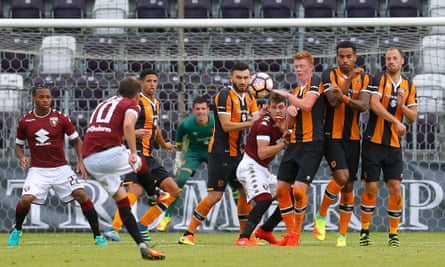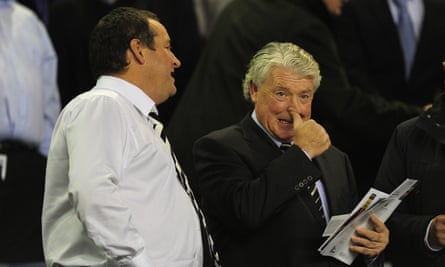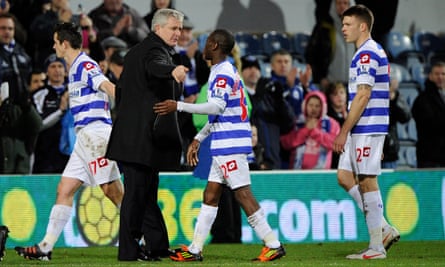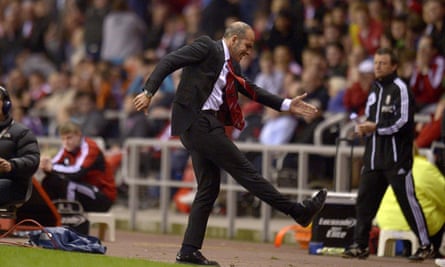Hull City – summer 2016
Has there ever been a worse-prepared Premier League side than promoted Hull City? Almost a month after Steve Bruce walked out in despair they still lack a permanent manager and will be under the caretaker stewardship of Mike Phelan when Leicester City visit the KC Stadium on Saturday.
The failure to make a single signing this summer has been exacerbated by an injury crisis and the sale of Mohamed Diamé, an influential midfielder and arguably Hull’s best player, to the Championship side Newcastle United.
It leaves Phelan with 13 fit senior professionals – including two goalkeepers – and Hull fans planning protests against the owners, the Allam family, this weekend. With Assem Allam, the owner, seriously ill, Hull is being run by his son Ehab, who seems anxious to sell up and is in advanced talks with a Chinese consortium.
Yet any takeover is almost certainly weeks away and there is no sign of reinforcements to compensate for the injury-induced loss of the first-choice goalkeeper Allan McGregor, plus Michael Dawson, Alex Bruce and the right-back Moses Odubajo for a collective 21-month total.
With another centre-half, Harry Maguire, struggling for fitness, Jake Livermore, a midfielder, is set to start in central defence against Leicester, alongside Curtis Davies, Phelan’s sole fit orthodox stopper.

Newcastle United – summer 2013

Joe Kinnear’s appointment as the director of football thoroughly upset the applecart at St James’ Park. While Derek Llambias, the club’s managing director, resigned in protest at one of the owner, Mike Ashley’s, more left-field manoeuvres Alan Pardew felt thoroughly undermined.
If Newcastle’s then-manager was unhappy at having Kinnear as his boss some first-team players were horrified. During a radio interview to mark his new job, the former Wimbledon manager – who also had a brief reign, ended by heart problems, in the dugout at St James’ Park – mispronounced a string of names, with Yohan Cabaye becoming Yohan Kebab and Llambias, Derek Lambezee. Kinnear then declared he had “more intelligence” than Newcastle fans.
Elsewhere, Newcastle’s controversial new shirt sponsorship deal with Wonga, the pay-day lender, provoked unrest, with the principal striker Papiss Cissé, a Muslim, initially refusing to wear the branded kit on religious grounds. Cissé relented – but only after being excluded from a pre-season training camp in Portugal and extensive, intricate, negotiations with Imams, Islamic law specialists and the PFA.
What happened next? Kinnear resigned in February 2014, shortly after selling Cabaye to Paris Saint-Germain for £20m. A month later Pardew received a hefty touchline ban for head-butting the Hull midfielder David Meyler. Despite an ostensibly respectable 10th-placed finish, the campaign was punctuated by fan revolts against Ashley and Pardew and the team lost eight of their last 10 league games.
QPR – summer 2012

Mark Hughes presided over his first – and, as it turned out, last – pre-season at Loftus Road pledging that relegation fights were a thing of the past.
It was not to be: well before August, insiders joked that the sign on his door, “Mark Hughes, OBE” – stood for “out by Easter”.
A bewildering array of often expensive and, invariably, extravagantly paid signings included José Boswinga, Esteban Granero, Park Ji-sung, Samba Diakité, Junior Hoilett, Rob Green and Julio César arrived.
With it swiftly becoming apparent the imports were either past their best or not as good as advertised, Hughes’s problems were increased by the emergence of a damaging dressing room schism between the old guard inherited from his predecessor, Neil Warnock and the new faces.
The chairman Tony Fernandes’s evangelical enthusiasm for broadening QPR’s global appeal dictated too many signings seemed commercially driven. When Park signed from Manchester United in July the champagne flowed as he was presented to the media high up in London’s Millbank Tower. Talk about pride coming before a fall.
What happened next? Hughes was sacked in November after 12 league games produced no wins and only four points. He is now impressing at Stoke City. Harry Redknapp took over but failed to prevent QPR’s relegation to the Championship in April 2013. Now managed by Jimmy Floyd Hasselbaink they remain in the second tier.
Sunderland – summer 2013

Paolo Di Canio promised “complete revolution” but provoked revolt at the Stadium of Light.
In banning ketchup, mayonnaise, ice in coke – the former West Ham forward was adamant it causes terrible indigestion – caffeine and singing in the showers, Di Canio raised eyebrows but the real damage was done by the club’s new director of football, Roberto De Fanti, who signed 14 new players that summer. Di Canio claimed none had been his choices.
An eclectic group including Jozy Altidore, Cabral, Charis Mavrias, Modibo Diakité and Valentin Roberge swiftly found themselves surplus to requirements.
“The atmosphere was intimidating,” said the former Sunderland striker Steven Fletcher. “Paolo didn’t want us to smile and laugh in training.” Lee Cattermole, a dressing room leader, was stripped of the captaincy and banished to train with the youth team.
What happened next? Sunderland took one point from their first five league games and Di Canio was sacked in September following a player mutiny. The rebellion began following a 3-0 defeat at West Brom and continued during a stormy Sunday morning training session. Afterwards a group of dissenting senior players, the newly recalled Cattermole prominent among them, visited Margaret Byrne, then the chief executive. Di Canio was dismissed that afternoon. His successor, Gus Poyet, presided over a last-gasp escape from relegation the Uruguayan dubbed “miraculous”. Sunderland also reached the League Cup final, losing to Manchester City.
Aston Villa – summer 2015

Tim Sherwood had saved Aston Villa from relegation while leading them to the FA Cup final but things swiftly began unravelling.
Sherwood became openly critical of the recruitment strategy, hinting that many of the 13 – predominantly French – players signed during the close season at a cost of £52.5m were not his choices and, crucially, lacked Premier League experience.
If the manager seemed deeply uneasy about a statistics-driven scouting department run by the head of recruitment, Paddy Riley, and the new sporting director, Hendrik Almstadt, it also hardly helped that Randy Lerner, very much an absentee owner, was endeavouring to sell Villa.
Or that Christian Benteke and Fabian Delph were sold for a collective £40m. Small wonder Idrissa Gueye, Jordan Ayew, Jordan Veretout and Adama Traoré were soon suffering nasty doses of culture shock.
What happened next? Sherwood was sacked in October following six straight defeats. Villa were bottom, having won only one league game. His successor, Rémi Garde, lasted until March. They finished 20th with 17 points, and are now managed by Roberto Di Matteo and under Chinese ownership.
Portsmouth – summer 2009

Talk of serious financial problems mounted during a summer in which Glen Johnson, Peter Crouch, Nico Kranjcar and Sylvain Distin were sold and inadequately replaced. Before a ball was kicked, Paul Hart, who had succeeded Tony Adams that spring, knew he was seriously up against it.
What happened next? The players were not paid in October, the month Hart was replaced by Avram Grant. In February Revenue & Customs issued a winding-up order. After avoiding liquidation, Portsmouth went into administration. They were relegated to the Championship but reached the FA Cup final, losing to Chelsea, though Grant subsequently resigned. Portsmouth were relegated after two seasons in the Championship and again a year later, and are starting a fourth season in League Two.

Comments (…)
Sign in or create your Guardian account to join the discussion